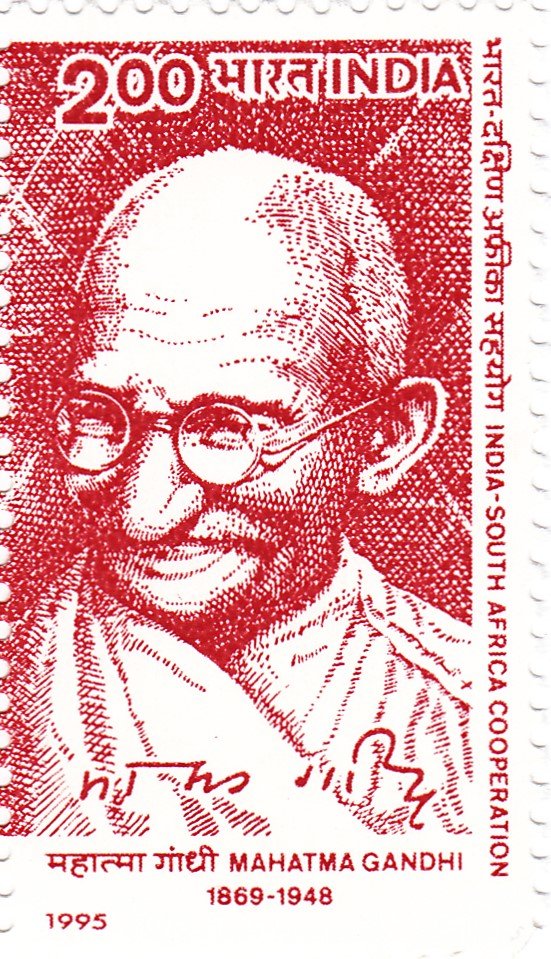India-South Africa Cooperation – Gandhi Wearing Dhoti

Technical Data
| Stamp Set | Mahatma Gandhi Memorial |
|---|---|
| Date of Issue | October 2, 1995 |
| Denomination | Rs. 2 |
| Quantity | 105,000 |
| Perforation | comb 13¼ x 13 |
| Printer | Security Printing Press, Nashik |
| Watermark | No Watermark |
| Colors | Scarlet |
| Catalog Codes |
Michel IN 1476 Stamp Number IN 1535 Yvert et Tellier IN 1254 Stanley Gibbons IN 1638 |
| Themes | Anniversaries and Jubilees | Famous people | Freedom Fighters | Joint Issues | Men | Optical Instruments |
Table of Contents
Commemorative Stamp: 125th Birth Anniversary of Mahatma Gandhi
Overview
This commemorative stamp, released on October 2, 1995, honors the 125th birth anniversary of Mahatma Gandhi, a figure whose commitment to non-violence and justice has had a profound influence on global movements for equality and human rights. The stamp not only celebrates Gandhi’s legacy but also highlights the shared struggle against racial discrimination, exemplified by Nelson Mandela’s leadership in South Africa.
Historical Context
Less than a century ago, racial segregation was not only accepted but also enforced by law in many parts of the world. This system of racial discrimination reached its most extreme form in South Africa with apartheid, a legally enforced policy that oppressed people based on their race. The ruling minority in South Africa believed that those of black, colored, and brown races were inferior, and thus, these groups were denied access to the same opportunities and resources as the white population.
Gandhi’s Stand Against Racial Injustice
Mohandas Karamchand Gandhi, later known as Mahatma Gandhi, first encountered the harsh realities of racial discrimination in South Africa. He found himself among the oppressed and quickly recognized the deep immorality of the system. However, instead of responding with anger or violence, Gandhi chose a path of peaceful resistance. He organized non-violent mass movements against unjust racial laws, pioneering the concept of satyagraha—a form of non-violent resistance grounded in the moral principle of truth and love.
Gandhi’s methods were unique in that they rejected violence and hatred. He believed in opposing the injustice of the system while maintaining love and respect for those who upheld it, seeking to win them over to the side of justice. These early experiments in South Africa laid the foundation for his later struggles in India, where he led efforts to achieve social equality, economic self-reliance, and political freedom from British colonial rule.
Influence on Nelson Mandela and the Anti-Apartheid Movement
Mahatma Gandhi’s crusade against racist laws in South Africa did not end with his departure from the country. His philosophy of non-violence and justice was taken up by the African National Congress (ANC) and found a powerful advocate in Nelson Mandela. Mandela, who later became the first black President of South Africa, believed in the importance of reconciliation over vengeance, echoing Gandhi’s approach to dealing with former oppressors.
Mandela’s government of national reconstruction aimed to heal the deep wounds left by apartheid, providing an African and human answer to the challenges that Gandhi had once faced. In Mandela’s leadership, the world saw a continuation of Gandhi’s legacy—one that promoted unity, peace, and human dignity.
Commemorative Stamp Design
The stamp design symbolizes the connection between Gandhi’s work in South Africa and its lasting impact on global human rights movements. The cancellation features a line drawing of Pietermaritzburg Railway Station, where Gandhi experienced a pivotal moment of racial discrimination. This incident is widely recognized as the beginning of his journey towards satyagraha, a path that would later inspire movements for justice across the world.
Significance
This stamp serves as a tribute to the enduring legacy of Mahatma Gandhi, whose principles of non-violence, truth, and justice continue to inspire leaders like Nelson Mandela and movements for human rights around the world. By releasing this stamp on Gandhi’s 125th birth anniversary, the Department of Post not only commemorates Gandhi’s life but also reinforces the universal values of peace and equality that he championed.
In Mandela’s words, Gandhi represents “the moral force he extols, the goodness he invokes, the justice and balance with which he seeks to promote human society.” This stamp reminds us of the common heritage that links Gandhi and Mandela, and the shared belief in a single human family, bound by justice and compassion.
